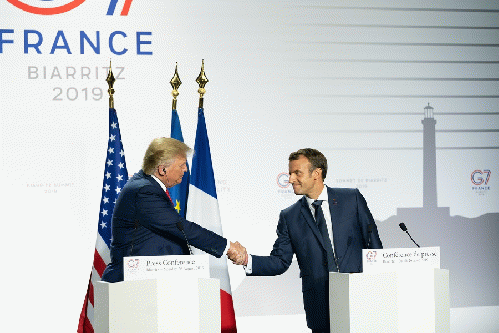From Consortium News
Russophobic rhetoric persists in Washington, but a counter-argument is emerging.

G7 leaders gather for a 'family' photo, Aug. 25, 2019, Biarritz, France.
(Image by (White House/Shealah Craighead)) Details DMCA
Are Western democracies, the U.S. and France in the lead, rethinking the hostility toward Russia they conjured out of nothing since Moscow responded to the coup Washington cultivated in Ukraine five years ago? Will Trump eventually succeed in putting ties with Russia on a more productive path triumphing over the hawks hovering around him? Have the Europeans at last grown weary of following the U.S. lead on Russia even as it is against their interests to do so?
In desultory fashion over the past month or so, we have had indications that the policy cliques in Washington are indeed reconsidering the Cold War II they set in motion during the Obama administration's final years. And President Donald Trump, persistent in his effort to reconstruct relations with Russia, now finds an unlikely ally in Emmanuel Macron. This suggests a nascent momentum in a new direction.
"Pushing Russia away from Europe is a profound strategic mistake," the French president asserted in a stunning series of remarks to European diplomats immediately after the Group of 7 summit in Biarritz late last month.
This alone is a bold if implicit attack on the hawkish Russophobes Trump now battles in Washington. Macron then outdid himself: "We are living the end of Western hegemony," he told the assembled envoys.
It is difficult to recall when a Western leader last spoke so truthfully and insightfully of our 21st Century realities, chief among them the inevitable rise of non-Western nations to positions of parity with the Atlantic world. You have nonetheless read no word of this occasion in our corporate media: Macron's startling observations run entirely counter to the frayed triumphalism and nostalgia that grip Washington as its era of preeminence fades.

President Donald J. Trump and French President Emmanuel Macron in joint press conference in Biarritz, France, site of the G7 Summit, Aug. 26, 2019.
(Image by (White House/ Andrea Hanks)) Details DMCA
There is much to indicate that the West's aggressively hostile posture toward Russia remains unchanged. The Russophobic rhetoric emanating from Washington and featured daily in our corporate television broadcasts continues unabated. Last month Washington formally abandoned the bilateral treaty limiting deployment of intermediate-range ballistic missiles, signed with Moscow in 1987. As anyone could have predicted, NATO now suggests it will upgrade its missile defense systems in Poland and Romania. This amounts to an engraved invitation to the Russian Federation to begin a new arms race.
But a counter-argument favoring a constructive relationship with Russia is now evident. This is not unlike the abrupt volte-face in Washington's thinking on North Korea: It is now broadly accepted that the Korean crisis can be resolved only at the negotiating table.
The Times Are Changing
The New York Times seems to be on board with this this sharp turn in foreign policy. It reported the new consensus on North Korea in a news analysis on July 11. Ten days later it published another arguing that it's time to put down the spear and make amends with Moscow. Here is the astonishing pith of the piece: "China, not Russia, represents by far the greater challenge to American objectives over the long term. That means President Trump is correct to try to establish a sounder relationship with Russia and peel it away from China."
It is encouraging that the Times has at last discovered the well-elaborated alliance between Moscow and Beijing. It took the one-time newspaper of record long enough. But there is another feature of this article that is important to note: It was published as a lead editorial. This is not insignificant.
It is essential, when reading the Times, to understand the close not to say corrupt relations it has maintained with political power in Washington over many generations. This is well-documented in histories of the paper and of institutions such as the CIA. An editorial advancing a policy shift of this magnitude almost certainly reflects the paper's close consultations, at senior levels of management, with policy-setting officials at the National Security Council, the State Department, or at the Pentagon. The editorial is wholly in keeping with Washington's pronounced new campaign to designate China as America's most dangerous threat.
It is impossible to say whether Trump is emboldened by an inchoate shift of opinion on Russia, but he flew his banner high at the Biarritz G7. Prior to his departure for the summit in southwest France he asserted that Russia should be readmitted to the group when it convenes in the U.S. next year. Russia was excluded in 2014, following its annexation of Crimea in response to the coup in Kiev.
(Note: You can view every article as one long page if you sign up as an Advocate Member, or higher).





